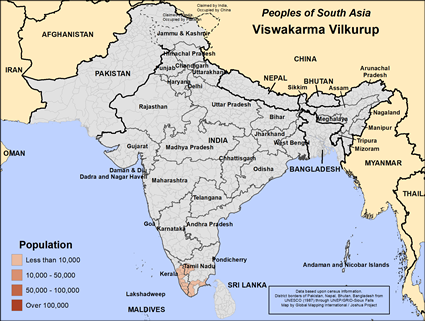Viswakarma Vilkurup in India

Send Joshua Project a photo
of this people group. |

Map Source:
People Group data: Omid. Map geography: UNESCO / GMI. Map Design: Joshua Project
|
| People Name: | Viswakarma Vilkurup |
| Country: | India |
| 10/40 Window: | Yes |
| Population: | 13,000 |
| World Population: | 13,000 |
| Primary Language: | Malayalam |
| Primary Religion: | Hinduism |
| Christian Adherents: | 0.00 % |
| Evangelicals: | 0.00 % |
| Scripture: | Complete Bible |
| Ministry Resources: | Yes |
| Jesus Film: | Yes |
| Audio Recordings: | Yes |
| People Cluster: | South Asia Hindu - Viswakarma |
| Affinity Bloc: | South Asian Peoples |
| Progress Level: |
|
Introduction / History
Viswakarma are a large group of Hindu people who live in India and Sri Lanka. They are followers of Visvakarman, the Hindu god of craftsmen and builders. The Viswakarma claim to be descendants of this god. Hence, today the term Viswakarma denotes a community of artisans. They are goldsmiths, carpenters, blacksmiths, copper workers and stonemasons. Their caste has ancient roots being referred to in the Hindu Vedas. Some believe that they made chariots, armor and weapons for royalty.
The Viswakarma played a vital role in the Indian village economy. They consider themselves spreaders of Hindu civilization, culture and religion through their art and crafts. They have contributed greatly to Indian civilization and culture as city and temple builders, engineers, architects, and artists.
In ancient India, Viswakarma where highly regarded. However, they are not as highly esteemed today by the Brahmins - the priestly Hindu caste. The origin of this ancient feud is largely unknown, but one reason was the refusal of Brahmins to recognize the status of the Viswakarma as equals. The Viswakarma have rejected the leadership or supremacy of the Brahmins. They have set themselves up as spiritual guides and religious teachers for other Hindus.
The two main languages or the Viswakarma are Telegu and Tamil. They also speak other regional Indian languages such as Malayalam, the language of Kerala.
Where Are they Located?
This Viswakarma group only lives in Kerala, a state in southwestern India.
What Are Their Lives Like?
The Vilkarup Viswakarma communal identity has always been strongly tied to their professions as craftsmen. With industrialization and more recently, globalization, their traditional artisan trades are declining. Their socio-economic status varies from a very high level to the low level in different parts of India. They tend to earn higher wages in cities but lower incomes in villages.
The Vilkurup Viswakarma marry within their group. Marriage to one spouse is the norm. Families arrange marriages with the consent of the young people. Sons inherit their father's property with the eldest son becoming the head of the family. Caste councils settle legal disputes and promote their interests.
What Are Their Beliefs?
The Vilkurup Viswakarma practice Hinduism, the ancient religion of India. They worship and serve the gods of the Hindu pantheon, especially Viswakarman, the god of craftsmen. Hindus believe that by performing rituals and good works that they will attain moksha or freedom from the endless cycle of birth, death and rebirth. The Vilkurup Viswakarma visit Hindu temples and offer prayers, food, flowers and incense to their gods. There are many forms of Hinduism, each with its own deities and beliefs.
The main yearly holidays of the Viswakarma peoples are Holi, the festival of colors, Diwali, the festival of lights, Navratri, the celebration of autumn and Rama Navami, Rama's birthday.
What Are Their Needs?
The Vilkurup Viswakarma need help in learning new job skills as their ancient occupations are disappearing. They need to understand that Hinduism will not get them right with a holy, personal God. The Vilkurup Viswaskarmas must hear and respond to the life-changing message of Jesus Christ.
Prayer Points
Pray for gospel workers to catch a vision for reaching the Vilkurup Viswakarma for Jesus and that in God's sovereign timing their hearts would be open and ready to follow Him.
Pray for Jesus movements to bless Vilkurup Viswakarma families so the gospel will spread rapidly among this people group.
Pray for the spiritual lives of the Vilkurup Viswakarma people to become fruitful as they follow Christ.